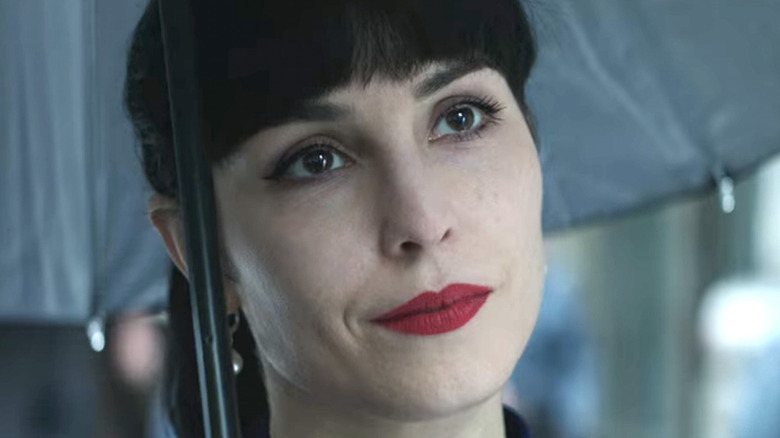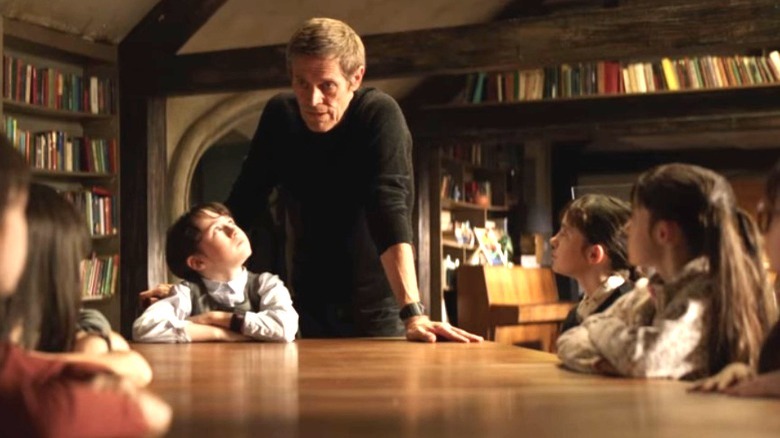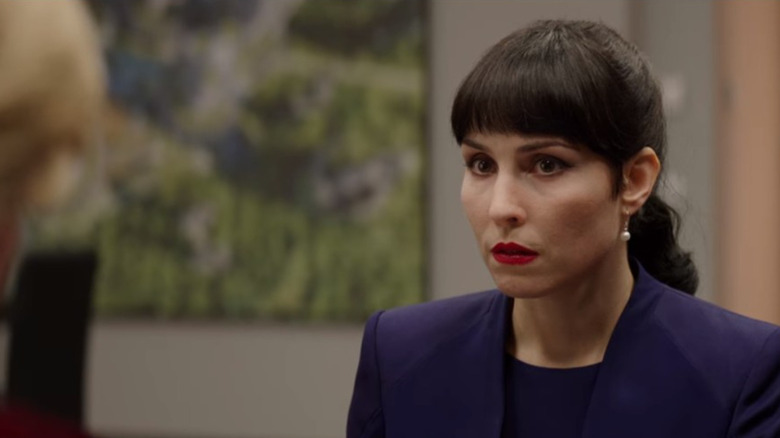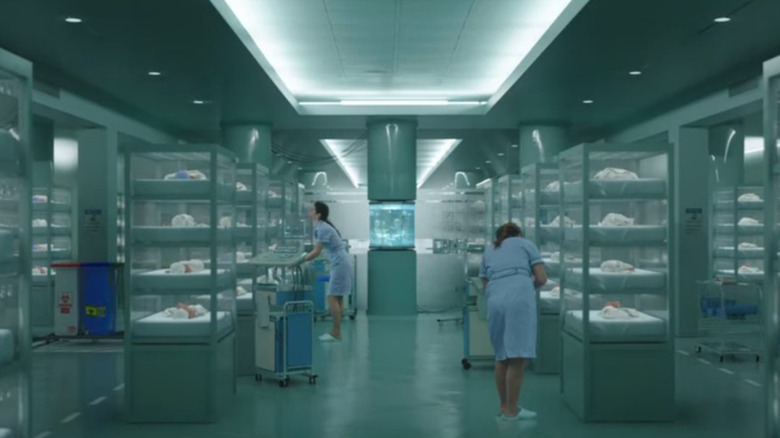The Ending Of What Happened To Monday Explained
What's more relaxing than turning on Netflix after a long day and watching some good ol' dystopian science fiction? Netflix's 2017 film "What Happened to Monday" may not be the most acclaimed sci-fi dystopian film out there, earning a middling 61% on Rotten Tomatoes, but it nevertheless offers a fresh and original take on the subgenre that raises timely questions. Taking place in an overpopulated world that has implemented a one-child policy, the film follows a family of identical septuplets (all played by Noomi Rapace) whose strategically planned lifestyle goes south when one of them goes missing.
Dystopian settings have proven to be some of the most varied and fascinating realms of science fiction. From "Planet of the Apes" to "Mad Max: Fury Road," there's an endless array of cinematic interpretations of humanity's downfall that we can't get enough of. Peeling back the layers of these movies and what they're trying to convey through their stories not only provides a better understanding of the films themselves but also has the potential to make us question the world we live in today. So just what can we learn from the ending of "What Happened to Monday" and the varying elements that lead up to it?
The septuplets live in hiding
"What Happened To Monday" is set in a future world in which there is a one-child policy in place to avoid resource problems associated with overpopulation. When Karen Settman (Marie Everett) passes away while giving birth to the identical septuplets, her father, Terrence Settman (Willem Dafoe), takes the children in and raises them in a very specific lifestyle.
Each child, named after a day of the week, will be able to leave the house on the day that correlates with their name (Monday goes out Monday, Tuesday on Tuesday, etc.), with all of them assuming the identity of their mother, Karen, when they are outside. At the end of the day, they must give one another detailed reports of their day for the following days' siblings to be aware of. This also includes making sure each child appears identical in every way, including blemishes and injuries.
This lifestyle, which the girls manage to keep going for the next 30 years or so, brings about the film's major conflict between fulfilling selfish, moral desires over the needs of society and the global population. For Terrence, his motivation to keep his grandchildren alive outweighs the knowledge that he is breaking the law and further adding to the dreaded overpopulation dilemma. But on top of that, it isn't even especially beneficial to the siblings. Yes, they get to stay together and live, but having to lead such an overly controlled lifestyle rather than thriving on their own terms begins to negatively affect them.
Monday has a little secret
When Monday fails to return home one day, the other sisters are understandably concerned. Things get even worse when Tuesday makes an attempt to find Monday and gets abducted by the Child Allocation Bureau (CAB), which is the organization that supposedly takes extra children who are born and puts them into cryosleep. The remaining sisters go on the hunt for Monday while also trying to avoid the sudden barrage of bureau agents who make numerous attempts to apprehend them. One by one, they're picked off and killed by the agents, until Thursday and the still-missing Tuesday and Monday are all who are left. Thursday teams up with Adrian Knowles (Marwan Kenzari), a bureau guard who is in love with Monday, to infiltrate the building and find her.
Monday is found alive and well, but it's then revealed that Monday is the one who initially gives away her sisters' location to Nicolette Cayman (Glenn Close), the head of the CAB. Is it because she suddenly develops support for the CAB's drive to stop overpopulation? No. Instead, Monday is repeating her grandfather's mistakes, turning her sisters in because she is pregnant with twins and wants to protect them. Tuesday is also found alive and is kept hostage as a way to ensure that Monday won't back out. Once again, the human dilemma of want versus need comes to play. Monday weighs her siblings' lives against those of her children and decides that her children are more important. Yet her decision is still rather selfish, as she only considers her own children, willing to make a deal with the CAB while still allowing the organization to continue to take away other children. At the same time, Monday also does this as a way to break free of the monotonous, meaningless lifestyle she has led for the last 30 years.
Are we truly saved?
Another big reveal that is uncovered by the end of the film is what is actually happening to all of the extra siblings who are discovered by the bureau. Nicolette Cayman assures the public that all but the eldest siblings are put into cryosleep to ensure their safety. However, when Adrian Knowles manages to sneak Thursday into the headquarters, it's discovered that Cayman's tales are all lies, as they incinerate a child right before their eyes.
Thursday records the cruel act and shows it during Cayman's campaign fundraiser happening shortly after, and chaos ensues, leading to Monday getting fatally shot, Cayman being sentenced to death, and the one-child policy getting revoked. Despite her death, Monday's children are saved and develop in an artificial womb, and the final image of "What Happened To Monday" sees nurses tending to several hundred newborns in an enormous ward.
So it all seems like a happy ending right? Well, not exactly. This is where the film's themes of morals versus societal needs come to a conclusion. While it is satisfying to know that families no longer have to be burdened and no more children will be killed, the fact remains that the overpopulation problem is still a very real dilemma. Cayman's ideas, although immoral and full of lies, are not completely unjustified, and without the one-child policy, this version of humanity is in for some trying times ahead.
Like any good dystopian sci-fi, "What Happened to Monday" forces us to reexamine the world we live in. What problems could be solved if we put aside our selfish desires? Will a day ever come when it's too late to turn back? Or can we adjust to working together for the betterment of mankind? Regardless of how you take the ending, there's no question that "What Happened to Monday" leaves more than enough food for thought to last a lifetime.



